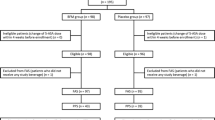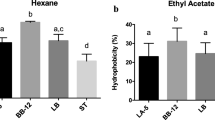Abstract
Probiotic foods such as probiotic strain-fermented milk or supplements proposing various health claims are now available. The beneficial effects of these probiotic foods on the digestive system are expected for not only healthy persons but also patients with diseases of the alimentary tract. This review focused on the rationale of using our Bifidobacterium strains-fermented milk as an adjunct for the prevention of recurrence or exacerbation of colitis. Animal experiments using gnotobiotic colitis or spontaneously colitis models and also human clinical trials of ulcerative colitis patients showed the potential of Bifidobacterium strains-fermented milk as a beneficial anti-colitis adjunct.




Similar content being viewed by others
References
Eckburg PB, Bik EM, Bernstein CN, Purdom E, Dethlefsen L, Sargent M, Gill SR, Nelson KE, Relman DA (2005) Diversity of the human intestinal microbial flora. Science 308(5728):1635–1638
Fukui S, Shimoyama T, Tamura K, Yamamura M, Satomi M (1997) Mucosal blood flow and generation of superoxide in rat experimental colitis induced by succinic acid. J Gastroenterol 32(4):464–471
Furrie E, Macfarlane S, Cummings JH, Macfarlane GT (2004) Systemic antibodies towards mucosal bacteria in ulcerative colitis and Crohn’s disease differentially activate the innate immune response. Gut 53(1):91–98
Hotta M, Sato Y, Iwata S, Yamashita N, Sunakawa K, Oikawa T, Tanaka R, Watanabe K, Takayama H, Yajima M et al (1987) Clinical effects of Bifidobacterium preparations on pediatric intractable diarrhea. Keio J Med 36(3):298–314
Imaoka A, Shima T, Kato K, Mizuno S, Uehara T, Matsumoto S, Setoyama H, Hara T, Umesaki Y (2008) Anti-inflammatory activity of probiotic Bifidobacterium: enhancement of IL-10 production in peripheral blood mononuclear cells from ulcerative colitis patients and inhibition of IL-8 secretion in HT-29 cells. World J Gastroenterol 14(16):2511–2516
Ishikawa H, Akedo I, Umesaki Y, Tanaka R, Imaoka A, Otani T (2003) Randomized controlled trial of the effect of bifidobacteria-fermented milk on ulcerative colitis. J Am Coll Nutr 22(1):56–63
Kato K, Mizuno S, Umesaki Y, Ishii Y, Sugitani M, Imaoka A, Otsuka M, Hasunuma O, Kurihara R, Iwasaki A, Arakawa Y (2004) Randomized placebo-controlled trial assessing the effect of bifidobacteria-fermented milk on active ulcerative colitis. Aliment Pharmacol Ther 20(10):1133–1141
Kitajima H, Sumida Y, Tanaka R, Yuki N, Takayama H, Fujimura M (1997) Early administration of Bifidobacterium breve to preterm infants: randomised controlled trial. Arch Dis Child Fetal Neonatal Ed 76(2):F101–F107
Kühn R, Löhler J, Rennick D, Rajewsky K, Müller W (1993) Interleukin-10-deficient mice develop chronic enterocolitis. Cell 75(2):263–274
Lichtiger S, Present DH, Kornbluth A, Gelernt I, Bauer J, Galler G, Michelassi F, Hanauer S (1994) Cyclosporine in severe ulcerative colitis refractory to steroid therapy. N Engl J Med 330(26):1841–1845
Matsuda H, Fujiyama Y, Andoh A, Ushijima T, Kajinami T, Bamba T (2000) Characterization of antibody responses against rectal mucosa-associated bacterial flora in patients with ulcerative colitis. J Gastroenterol Hepatol 15(1):61–68
Matsumoto S, Okabe Y, Setoyama H, Takayama K, Ohtsuka J, Funahashi H, Imaoka A, Okada Y, Umesaki Y (1998) Inflammatory bowel disease-like enteritis and caecitis in a senescence accelerated mouse P1/Yit strain. Gut 43(1):71–78
Matsumoto S, Watanabe N, Okabe Y, Umesaki Y (1999) Enteric bacteria and their roles in inflammatory bowel disease. Biosci Microflora 18(1):1–9
Matsumoto S, Watanabe N, Imaoka A, Okabe Y (2001) Preventive effects of Bifidobacterium- and Lactobacillus-fermented milk on the development of inflammatory bowel disease in senescence-accelerated mouse P1/Yit strain mice. Digestion 64(2):92–99
Mazmanian SK, Round JL, Kasper DL (2008) A microbial symbiosis factor prevents intestinal inflammatory disease. Nature 453(7195):620–625
Mombaerts P, Mizoguchi E, Grusby MJ, Glimcher LH, Bhan AK, Tonegawa S (1993) Spontaneous development of inflammatory bowel disease in T cell receptor mutant mice. Cell 75(2):274–282
Ohkusa T, Sato N, Ogihara T, Morita K, Ogawa M, Okayasu I (2002) Fusobacterium varium localized in the colonic mucosa of patients with ulcerative colitis stimulates species-specific antibody. J Gastroenterol Hepatol 17(8):849–853
Onderdonk BW (2000) Intestinal microflora and inflammatory bowel disease. In: Krisner JB (ed) Inflammatory bowel disease, 5th edn. W·B. Saunders, Philadelphia, pp 144–152
Rakoff-Nahoum S, Paglino J, Eslami-Varzaneh F, Edberg S, Medzhitov R (2004) Recognition of commensal microflora by toll-like receptors is required for intestinal homeostasis. Cell 118(2):229–241
Rath HC, Herfarth HH, Ikeda JS, Grenther WB, Hamm TE Jr, Balish E, Taurog JD, Hammer RE, Wilson KH, Sartor RB (1996) Normal luminal bacteria, especially Bacteroides species, mediate chronic colitis, gastritis, and arthritis in HLA-B27/human beta2 microglobulin transgenic rats. J Clin Invest 98(4):945–953
Reddy KP, Markowitz JE, Ruchelli ED, Baldassano RN, Brown KA (2007) Lamina propria and circulating interleukin-8 in newly and previously diagnosed pediatric inflammatory bowel disease patients. Dig Dis Sci 52(2):365–372
Rennick DM, Fort MM (2000) Lessons from genetically engineered animal models. XII. IL-10-deficient (IL-10(−/−) mice and intestinal inflammation. Am J Physiol Gastrointest Liver Physiol 278(6):G829–G833
Sadlack B, Merz H, Schorle H, Schimpl A, Feller AC, Horak I (1993) Ulcerative colitis-like disease in mice with a disrupted interleukin-2 gene. Cell 75(2):253–261
Scheppach W, Sommer H, Kirchner T, Paganelli GM, Bartram P, Christl S, Richter F, Dusel G, Kasper H (1992) Effect of butyrate enemas on the colonic mucosa in distal ulcerative colitis. Gastroenterology 103(1):51–56
Setoyama H, Imaoka A, Ishikawa H, Umesaki Y (2003) Prevention of gut inflammation by Bifidobacterium in dextran sulfate-treated gnotobiotic mice associated with Bacteroides strains isolated from ulcerative colitis patients. Microbes Infect 5(2):115–122
Sokol H, Pigneur B, Watterlot L, Lakhdari O, Bermúdez-Humarán LG, Gratadoux JJ, Blugeon S, Bridonneau C, Furet JP, Corthier G, Grangette C, Vasquez N, Pochart P, Trugnan G, Thomas G, Blottière HM, Doré J, Marteau P, Seksik P, Langella P (2008) Faecalibacterium prausnitzii is an anti-inflammatory commensal bacterium identified by gut microbiota analysis of Crohn disease patients. Proc Natl Acad Sci USA 105(43):16731–16736
Swidsinski A, Weber J, Loening-Baucke V, Hale LP, Lochs H (2005) Spatial organization and composition of the mucosal flora in patients with inflammatory bowel disease. J Clin Microbiol 43(7):3380–3389
Takaishi H, Matsuki T, Nakazawa A, Takada T, Kado S, Asahara T, Kamada N, Sakuraba A, Yajima T, Higuchi H, Inoue N, Ogata H, Iwao Y, Nomoto K, Tanaka R, Hibi T (2008) Imbalance in intestinal microflora constitution could be involved in the pathogenesis of inflammatory bowel disease. Int J Med Microbiol 298(5–6):463–472
Umesaki Y (1984) Immunohistochemical and biochemical demonstration of the change in glycolipid composition of the intestinal epithelial cell surface in mice in relation to epithelial cell differentiation and bacterial association. J Histochem Cytochem 32(3):299–304
Umesaki Y, Setoyama H (2000) Structure of the intestinal flora responsible for development of the gut immune system in a rodent model. Microbes Infect 2(11):1343–1351
Umesaki Y, Sakata T, Yajima T (1982) Abrupt induction of GDP-fucose: asialo GM1 fucosyltransferase in the small intestine after conventionalization of germ-free mice. Biochem Biophys Res Commun 105(2):439–443
Umesaki Y, Setoyama H, Matsumoto S, Okada Y (1993) Expansion of alpha beta T-cell receptor-bearing intestinal intraepithelial lymphocytes after microbial colonization in germ-free mice and its independence from thymus. Immunology 79(1):32–37
Umesaki Y, Okada Y, Matsumoto S, Imaoka A, Setoyama H (1995) Segmented filamentous bacteria are indigenous intestinal bacteria that activate intraepithelial lymphocytes and induce MHC class II molecules and fucosyl asialo GM1 glycolipids on the small intestinal epithelial cells in the ex-germ-free mouse. Microbiol Immunol 39(8):555–562
Acknowledgments
We wish to thank Dr. H. Ishikawa (Kyoto Prefectural University of Medicine), Dr. K. Kato (Nihon University School of Medicine), Drs. S. Matsumoto and R. Tanaka (Yakult Central Institute for Microbiological Research) for helpful discussion.
Author information
Authors and Affiliations
Corresponding author
Rights and permissions
About this article
Cite this article
Imaoka, A., Umesaki, Y. Rationale for Using of Bifidobacterium Probiotic Strains-Fermented Milk Against Colitis Based on Animal Experiments and Clinical Trials. Probiotics & Antimicro. Prot. 1, 8–14 (2009). https://doi.org/10.1007/s12602-008-9001-8
Received:
Accepted:
Published:
Issue Date:
DOI: https://doi.org/10.1007/s12602-008-9001-8




